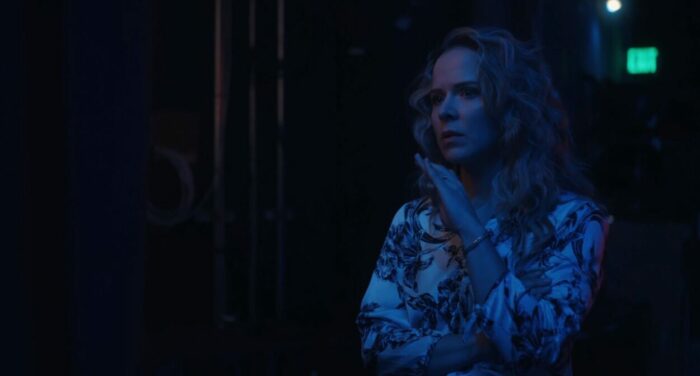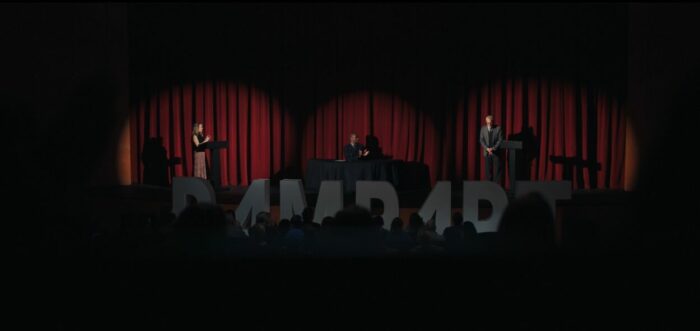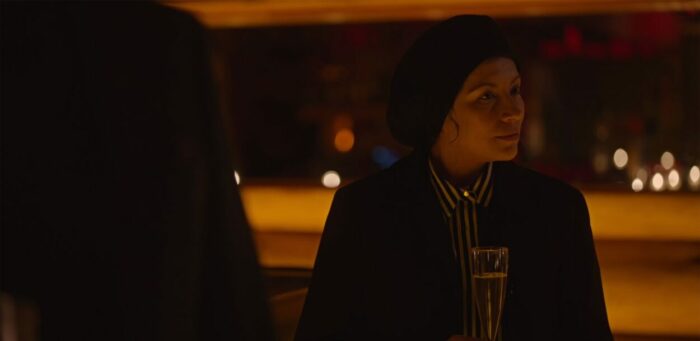One doesn’t see too many films like The Way We Speak these days. The feature film debut from writer-director Ian Ebright is made on a modest budget but sparkles with the sheen of a well-funded production, and with an excellent cast led by Patrick Fabian it tackles its ambitious themes with a crackling energy. Set against the backdrop of a high-profile academic debate between two rising luminaries—and the two very different epistemologies and debate styles each presents—The Way We Speak is unafraid to ask “Does God exist?” of its characters and its audience in ways that both enthrall and engage.
Fabian (Better Call Saul, The Last Exorcism) is one of the combatants—a belligerent, if you will, armed for a battle, as the graying, dapper Simon Harrington, a writer and thinker whose time seems finally to have come. Having long stood in the shadows to support his wife’s career, Simon is now ready to enjoy his moment in the spotlight. His writings on atheism and futurism have found a wide audience and earned him the opportunity to deliver a high-profile conference keynote and participate in its featured debate, where his opponent is slated to be a familiar face, his longtime friend and sparring partner.
There is, though, a wrinkle. That friend, George (Ricco DiStefano), suffers cardiac arrest on the eve of the debate. To Simon, who doesn’t want to miss the chance to cement his celebrity status, the show must go on. He’ll (with no small degree of hubris) debate anyone, on any topic, so the event organizers must find a substitute. The opponent: an up-and-coming young female Christian writer on faith and family; the topic: Does God exist?
Granted, the basic conceit of the narrative structure to The Way We Speak sounds, on the surface, more than a little choreographed, almost like an exercise where two opposing characters (one male, one female; one atheist, the other Christian; one in middle age, the other a generation younger) are thrown together via an extenuating circumstance. But no matter: very good films (House of Sand and Fog for one) have their origins in such structures. And to Ebright’s script’s credit, the characters are drawn so richly and their portrayers so convincing that nothing about the presentation seems at all artificial.
Sarah Clawson (Kailey Rhodes) is the Christian author who on the surface is all big eyes, flowing locks, fundy-baby voice, and oozing sincerity. If she were a Senator, and it’s not hard to image that someday she might be, she’d be giving State of the Union rebuttals from a kitchen-like set. But she is sharp as a tack, opportunistic as they come, and—as the audience realizes well before Simon does—one step ahead of him at almost every turn, her laser focus unwavering in her steady progress towards pop-culture stardom. Rhodes, whose credits have been to date nearly all on the stage, is a luminous presence onscreen, a magnetic personality who knows how to push buttons and weaponize her outward innocence.

Simon is the better debater, given his years of experience and callous demeanor. He can turn on the charm and then wrestle in the mud like a vengeful pig. He knows all too well how to parlay an opponent’s slight slip into a stinging ad hominem. But he’s also grieving his friend George’s absence and his wife Claire’s (Diana Coconubo) cancer. Desperate for his chance to shine, determined to “win” the debate, but unmoored by circumstance and more than a little hung over after a decades-long abstinence, when Simon makes a mistake, it’s a big one, silencing the audience and emptying the stage, maybe even costing him his marriage and his career.
Films that, like The Way We Speak, take place in any performative venue need to sway audiences that their performers and performances are genuine, that they have a degree of verisimilitude through the quality of that which they perform. The debates between Simon and Sarah here are wholly convincing, feeling very much like those on a high-profile academic debate stage where the two combatants wrestle for control of ideas, even if they may not completely control them themselves. Or, for that matter, control themselves, as Simon so clearly fails to do.

As Simon, Fabian delivers an impressive performance. He is by turns brilliant and (frankly) stupid, mature and childish, loving and churlish. He reminds me a bit, and not just for the silver-fox looks and gait, of John Slattery in Mad Men, oozing with a confidence that is more show than go. Rhodes makes for an excellent sparring partner, her character one his finds hard to knock and harder to knock out, and along the way she delivers several surprises. As Simon’s ill wife Claire, Coconubo has less to do but is nonetheless a formidable presence, her terminal illness bequeathing her an ability—and a duty—to tell Simon an inconvenient truth.

The film’s budget may be modest, but its look and style is sleek and modern. Much of it is interior, shot in and around Portland, a gray and cold pallor appropriate to the funereal proceedings. The onstage exchanges crackle with energy, much credit to the editing work of Robert Schafer (The Godfather Part III, the upcoming Megalopolis) and his savvy timing. A modernist score from Billow Observatory provides ambience to the lens work from A. J. Marson. It’s a visual and aural design that illuminates the film’s somber, if fiery, setting, and more importantly, one that provides its performers with an authentic milieu for their pitched battle.
The debate’s topic may tackle an unknowable, and its resolution offers little to the declared “winner.” The question of whether God exists is one that will likely change very few minds or save any souls among the characters who populate The Way We Speak. What Ebright’s thought-provoking film delivers is, in the absence of any false conclusions about God’s existence, a set of intelligent, multidimensional characters whose faith—or lack thereof—makes for the kind of drama that will linger with its audience long after the final credits roll.




